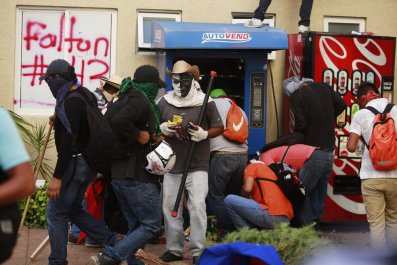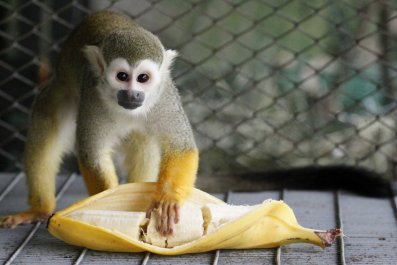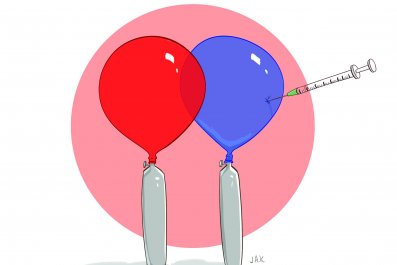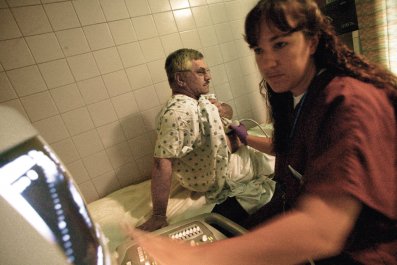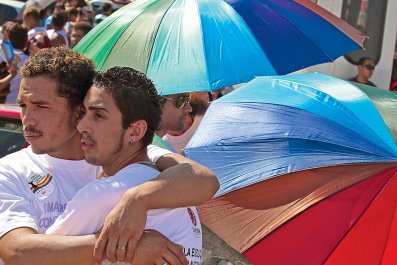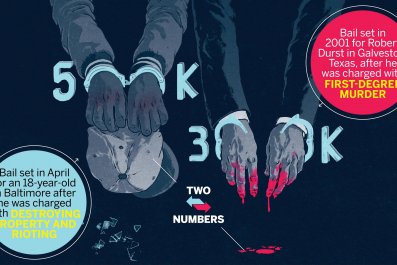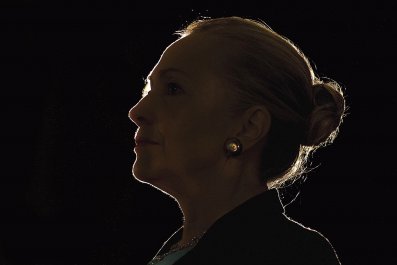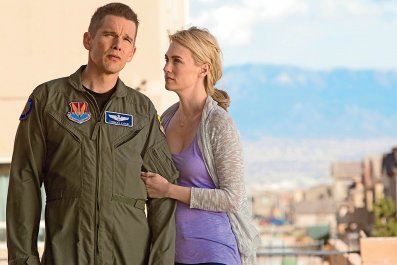"They forced us to kill, otherwise we would have been killed," says Djibrine, a 12-year-old from eastern Chad who was sent with other boys from his village to northern Nigeria a year ago to study at a Koranic school. Soon after the boys arrived, armed men from the Islamist militant group Boko Haram attacked the village and his school. "They took all the young people and killed all the others," Djibrine says.
"They began putting horrible ideas into our heads. They told us all the others were infidels, so they either had to be converted or killed; they made promises of the paradise that we would reach," says Djibrine. He and Djido Moussa, who is 14, are part of a group of 12 young Boko Haram fighters who managed to escape from Nigeria and reach the village of Ngouboua, Chad, where they gave themselves up to the authorities. They say they walked for days across the desert, under a burning sun, before they could get back to their homeland. "We decided to escape, to face a long journey, because we couldn't stand what we saw anymore, everything they made us do," says Djido Moussa. "We went to Nigeria only to study. Now we are in the hands of the army; I have no idea what they are going to do with us. I just hope I will be able to find and see my family again and start a new life."
For now, they sit on the ground, gazing into space, lined up and under guard, waiting to find out what will happen to them next.
In February, about 40 armed men from Boko Haram set fire to this small settlement, located on one of the several islands in Lake Chad. But the atmosphere is still charged with fear, and Ngouboua looks like a ghost village. The air still smells of ashes. Burnt cars remain on the dusty streets, surrounded by garbage. Houses are destroyed, roofs have crumbled and walls are stained by soot. Fishing boats are stranded on the shores of Lake Chad, the small shops have almost all closed down, and the market shows no sign of life except for a few young women sitting on street corners, trying to sell bread to passersby.
In the months before the attack, around 7,000 people from Baga, on the Nigerian side of the lake, fled their homes and found refuge here after seeing friends and relatives slaughtered. Now they have fled Ngouboua too, trying to save themselves from the attacks of Boko Haram, which has stepped up its operations on the islands and against villages in Chad.
Lake Chad, which is the fourth largest catchment basin of the African continent, forms a border of four countries: Nigeria, Niger, Chad and Cameroon. The leaders of those four countries vowed to wipe out Boko Haram and launched a military campaign against the group in recent months after violence spilled over from northeastern Nigeria. "The attack of the 13th February was the first on Chadian territory, and many others followed," says Idriss Brahim, chief of police in Ngouboua. "The population lives in fear. People continue to run away from here." He describes an ambush by Boko Haram a few weeks ago in Tchoukou Telia village that killed seven civilians. Chad has sent thousands of soldiers and police to install checkpoints and patrol the area, but it is a challenge to flush out the militants, says Brahim. "On these islands, [which are] difficult to reach, the army and the police are trying to identify terrorists hidden by the dense vegetation, where they have found refuge, but this is not so easy as conditions for intervention are quite difficult and militants hide among the civilians," he says.
"In the past few months, people from Chad and from Niger have joined Boko Haram, led firstly by the promise of making money and secondly by religious fanaticism," he says. Others, like Djibrine and Djido Moussa, are kidnapped and forced to fight.
Niger decided to evacuate some of its islands on Lake Chad in the past few days, after the latest deadly attack by Boko Haram in Karamga island, in which 46 soldiers and 28 civilians were killed.
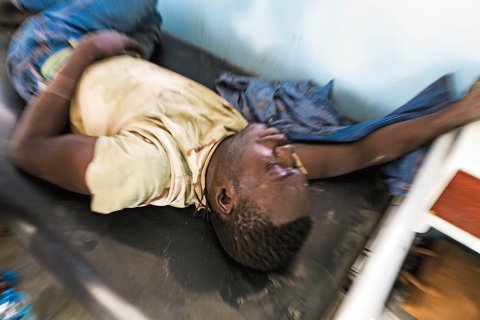
Last year, Boko Haram killed at least 6,000 people, according to a British monitoring organization called the Armed Conflict Location & Event Data Project. Since Nigeria launched a new offensive in January, and neighboring countries joined the fight, Boko Haram has suffered some important defeats and been driven back from key towns such as Maiduguri, leading to the release of some of the thousands of women and children kidnapped over the past year. But the battle is far from over, and as it plays out, thousands of people have fled their homes, exacerbating conditions in what was already one of the poorest and most unstable parts of Africa, plagued by malnutrition, cholera and malaria.
Each week, more people driven from their homes arrive at Chadian villages such as Bagasola and Forkouloum, either on foot or crossing Lake Chad in small wooden canoes. The United Nations has set up a refugee camp called Dar es Salaam, near Bagasola in Chad, where around 5,000 people have taken refuge. Hastily built in the desert, the site has no trees and therefore no shade, so people are left at the mercy of the stifling heat, made more miserable by sandstorms.
"They arrived on bikes, holding Kalashnikovs in their hands," says a 32-year-old man at the camp named Nassirou, recalling the moment Boko Haram attacked Baga in Nigeria. "They started shooting everybody: men, women, elders and children. We ran along the banks of the lake, we jumped into canoes and rowed as fast as we could," he says. "Those who failed to jump into canoes were killed; homes were destroyed; cattle were stolen. Now we have nothing. They claim to be Muslims, doing all this in the name of their religion. Almost all of us are Muslims."
Wind blows up sand and dust in the camp; tents made of plastic sheets and tied to wooden poles are barely tethered to the ground. Tucked in a corner, in one of the few spots of shade, Awa, who is 28, tries to cover her eyes while wrapping her arms around one of four children with her. A member of the Hausa tribe from northern Nigeria, she came here two months ago. Boko Haram took everything she had: her house, her husband, her job, her eldest son. "I have two other kids with me, their parents have been killed by terrorists," she says. "I cannot abandon them, they have no one left. Their future has been taken away from them."
She doesn't know if she will ever return to Nigeria. "Here life conditions are difficult to bear, but the idea of going back to where they tortured our friends and family scares me even more. There are foreign armies now fighting in northern Nigeria, but what will happen when they leave?"
Among the camp's residents are hundreds of children left alone, with no family, as well as many single women. "People who arrive here are facing enormous difficulties," says Alexandre Izart, field coordinator of Doctors Without Borders in this area. "On the one hand, the conditions of the camp, at the very edge of survival, on the other hand the trauma, often impossible to forget. When children have a pencil in their hand, they draw blood and death, and most of the women have suffered violence."
Izart says it is difficult to count the exact number of people who have fled here in recent months because many are just passing through, moving on when they can because of the harsh conditions in the camp. Those who do not meet the U.N.'s criteria for shelter at the refugee camp—it accepts only people who have fled their country rather than internally displaced people from Chad—are making do where they can. "They are hosted by families, who already have little or nothing to survive on. They are either hiding in the bushes or on the several islands on the lake," says Alice Sequi, head of the United Nations' Office for the Coordination of Humanitarian Affairs in N'Djamena, the capital of Chad.
"[That is] an extremely poor environment where bringing aid and intervention may be very difficult," she says. "The crisis…is not receiving the necessary support from donors and from the international community. We did not even collect a third of the amount we believed to be essential to meet the emergency."
The violence and influx of people have put pressure on the local economy, with the borders of Nigeria closed, businesses reduced to a flicker, and agricultural and fishing activities suspended for months. "The economy is blocked: Food prices have increased by 80 percent in the past few weeks; gasoline prices have reached unprecedented heights; fishing boats cannot sail anymore as they are blocked both by the army and the fear of attacks," says Mbaihomadji Waibo Job, commander of the gendarmerie of Bagasola. "This has always been the area where the majority of the wheat is cultivated for the country, but this year farmers didn't collect any.
"If things do not change quickly and Boko Haram is not defeated, the arrival of the rainy season and the poor food supply could cause a real human catastrophe."





